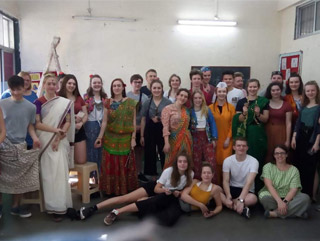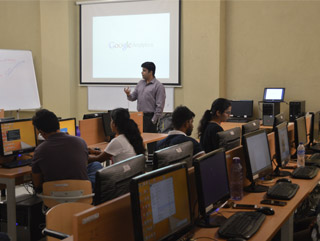Best Practice 01: Compulsory Internship of MMS Semester IV Students with NGOs for their Project on Social Relevance



1. Objectives of the Practice: To nurture and develop socially sensitive and responsible management professionals.
2. The Context: University of Mumbai modified its MMS syllabus in 2016-18 in order to make it more industry oriented. All MMS IV students from this batch onwards are required to work on three projects of 100 marks each in the areas of Specialization, General Management and Social Relevance. The rationale behind these changes is to give the management students first-hand experience and a feel of working in these areas which are very to their professional success.
3. The Practice: At PTVAIM each student undergoes an internship in each of the three areas mentioned above. They are allowed to work with the companies/organizations to complete their specialization and general management projects. But all of them have to do an internship with NGOs for the social relevance project. This is done to ensure that by working with the NGOs in various fields, our students will get to experience the problems/issues faced by the un-privileged/under-privileged sections of the society, thus turning them into socially sensitive, responsible individual. We adopt very systematic approach of assigning our students to various NGOs based on the area of interest with respect to social cause of students, the area in which he/she lives, skills required by student to work for a certain type of NGO, etc. Students are required to undergo an orientation session which is conducted by Mr. Pavan Sawant, former CEO of Muktangan. Our core faculty members work as mentors to these students. They are constantly in touch with the students and NGOs to understand how well and sincerely are our students working with these NGOs. Students convert this work done by them into a project report and submit it to their guide for approval. Upon receiving an approval by the guide, a viva is scheduled for the students in which outside experts evaluate the performance of the students on the basis of their presentation and report. This internship with the NGOs help us to nurture and develop value based, ethical management graduates.
4. Evidence of success: All our students have successfully completed these internships and submitted their project reports. Few students continued working with these NGOs even after the project was over as this kind of work gives them immense mental satisfaction. We have received feedback from NGOs praising our students and the Institute.
Problems Encountered and Resources Required:
1. Many NGOs do not have proper office set-up where students can go and do their work. In such situations students coordinated with NGOs and their beneficiaries using own resources.
2. Many NGOs make it clear in the beginning that they don’t have facilities such as computer which students need to work. Students arrange them on their own.
3. Beneficiaries of NGOs are many time hesitant to share problems with students as they are new to them.
Best Practice 02: Certificate Course in Digital Marketing (2018-19)



1. Objectives of the Practice: To bridge the skill gap and make students industry ready with hands on experience on various tools used for Digital Marketing.
2. The Context: The Practice of collaborating with Industry leaders and organizations and thereby fostering excellence in academia for student benefit has always been one of the most preferred practices at PTVAIM thereby bridging the knowledge gap. With this mission as a benchmark and the ever evolving demand for skilled professionals, PTVAIM launched a 36-hour Certificate Course in Digital Marketing in the Academic Year 2018-19 by liaising with M/s. Learning Catalyst who are pioneers in providing training to student and industry professionals in Digital Marketing domain.
3. The Practice: The process required us to invite and finalize the best proposals from various vendors providing courses in Digital Marketing for our students that would cover all the latest tools and techniques being practiced in the Industry. This was followed by drafting a formal Memorandum of Understanding which was mutually agreed upon and signed. The following were the salient features of the approach that were followed hands-on activities and exercises, scenarios covering problems relating to their domain were discussed. Focus was on capacity building and also on discussing best practices. Pre and post-training assessment was carried out, there was an online test which all learners took before and after the training. All participants had access to learn from the video courseware where they could be in touch with the faculty during the program duration. Assignments were submitted on the Learning Management System of the vendor. Scores were consolidated and on successful evaluation of the online tests and the end program presentation /case study the students were awarded certificate of successful completion of the certificate course.
4. Evidence of success: The number of students who successfully completed the course were 34 and the excellent feedback 4 on a scale of 5 of the Certificate Course in Digital Marketing gave us the impetus to conduct the course for the second consecutive year for students across all specialization which was approved by the Management.
5. Problems Encountered and Resources Required:
a. It was challenging to make students enroll for the course as it was the first time for the Batch 2018-20 that a Certificate Course was introduced.
b. It was challenging to motivate students to attend the course as this course required the students to put in additional time beyond their weekly lecture schedules.
c. The challenge was to accommodate extra time during the week and weekends and co-ordinate with the academic team for seamless delivery of the course without diluting the quality of the course and maintaining consistent level of motivation for the students.


